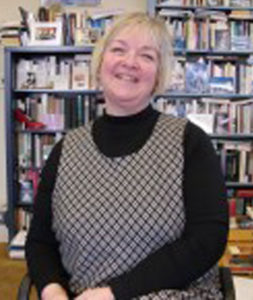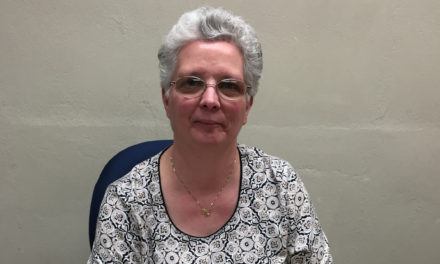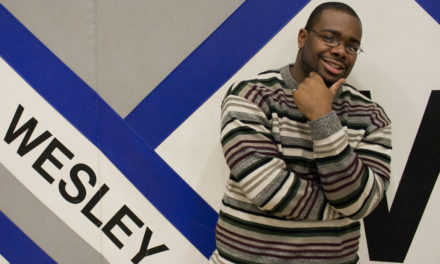By Kelly Morgan (Whetstone staff writer)
Like many other college students before her, Linda De Roche had a choice to make: should she go into history or literature?
“I struggled in my first year of college to decide on a major,” De Roche said. “Whether I was going to major in history and minor in English or vice-a-versa.”
De Roche shared an interest in history with her father.
“As a young girl, it was an interest I shared with my father,” she said. “We would travel battlefields when I was young. He would take me to ‘The Field Museum’ in Chicago where they had incredible Egyptology rooms. I was fascinated by all the mummies.”
De Roche was torn between her passion for history and English.
“I just loved Egypt and Ancient Greece,” De Roche said. “I really wanted to be an archeologist. I wanted to go out there and find something wonderful.”
 When De Roche saw archeologists at work in 1982 in England, she realized it wasn’t anything like an Indiana Jones movie.
“They were excavating the grip of Westminster Abbey,” she said. “Most archeological work, as I have discovered, is people digging with a teaspoon and finding little shards of bone or pottery. It’s nothing as exciting as finding King Tut’s tomb.”
History and ancient Egypt, however, could not compare to how she feels when she reads a novel.
“I really get to lose myself in others’ lives and others’ worlds when I read a novel,” she said. “I’m interested in history, but I don’t get lost in it.”
De Roche has been teaching English courses at Wesley since 1988.
A search for a tenured position – which offers a professor job security after several years of good work – brought De Roche to Wesley.
“Tenure is the goal of all college professors,” De Roche said. “It protects you and gives you a permanent job until you retire or do something really horrible.”
Besides English, one of De Roche’s other passions is the struggle to maintain academic freedom.
“A part of what academic freedom is about is to have the freedom to present your subject as you see it, without fear of being fired because you offended someone or you have not held the politically correct point-of-view,” she said.
De Roche earned her B.A. in English – with a minor in History, her second love – from Ball State University in 1974.
Originally, De Roche attended Ball State because of the reputation of its education program.
“Initially, I went to Ball State because I wanted to teach high school English,” she said. “Its Education program has one of the best reputations in the country. Two education courses into my undergraduate experience, I realized I didn’t want to teach high school, I wanted to teach college.”
In 1974, De Roche enrolled at the University of Notre Dame.
 She left in 1980 because she was offered a full-time teaching job at Ball State.
“At this point, I was what they call an ABD (‘all but done’),” De Roche said. “I had completed all but my dissertation.”
De Roche was awarded her Ph.D. in 1984 in English when she finished her 250-page dissertation on Henry James.
She wrote her dissertation on James because she loves his novels.
“This semester, I get to teach [about] him, so I’m excited,” De Roche said. “I’m teaching a class in American Realism this term, and I’ll have Henry James in that class. Regrettably for me, students find him boring.”
Tara Spillane, senior Liberal Arts major, has been taking courses with De Roche for four years.
“She’s a sweetheart and a great professor,” Spillane said. “She doesn’t give up on you and that makes you feel good about yourself.”
Kori Isken, junior Liberal Arts major, also enjoys De Roche’s classes.
“I like how she holds discussion with the whole class and gets everyone’s feedback,” Isken said. “She’s a smart lady that knows her stuff.”
De Roche spent years researching the American Civil War and living in Europe.
“When we were in London in 1982 to 1983, [my husband, John Pelzer] had discovered the letter books of a Confederate business in Liverpool about the American Civil War.”
De Roche said the south and London traded during the Civil War. The letter books were a collection of personal thoughts and views of the Confederates during the war.
“The letter books were fascinating,” she said. “They told about the struggles, the Southern reaction to certain battles and the Southern reaction to Lincoln’s Emancipation Proclamation.”
In 1986, De Roche and her husband were awarded a Fulbright Research Grant.
“It’s a very prestigious and competitive fellowship,” she said.
The husband-wife team published articles in “British Heritage,” “Civil War Times Illustrated,” and “History Today.”
Currently, she is writing her sixth book; a biography of Mary Higgins Clark.
De Roche will be taking her fifteenth trip to Europe with students this spring break.
“The trip I’m doing next month is connected to my Humanity’s seminar this semester called ‘The Lost Generation,'” De Roche said. “My course will follow the itinerary of Ernest Hemingway’s novel, ‘The Sun Also Rises.’
Wesley College students and De Roche will go where many American expatriates went during the 1920s. The group will travel from Paris, France, to Spain, visiting San Sebastian, Pamplona and Barcelona.





